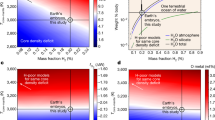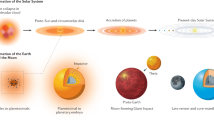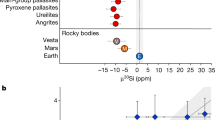Abstract
The early overluminous phase, during the condensation of the Sun can be a great help in understanding why the inner planets are largely made up of iron and magnesium silicate.
This is a preview of subscription content, access via your institution
Access options
Subscribe to this journal
Receive 51 print issues and online access
$199.00 per year
only $3.90 per issue
Buy this article
- Purchase on Springer Link
- Instant access to full article PDF
Prices may be subject to local taxes which are calculated during checkout
Similar content being viewed by others
References
Jeans, J. H., Astronomy and Cosmogony, chap. IX (Cambridge Univ. Press, 1928).
Alfvén, H., On the Origin of the Solar System (Oxford Univ. Press, 1954).
Hoyle, F., Quart. J. Roy. Astro. Soc., 1, 28 (1960).
Urey, H., The Origin of the Planets (Oxford Univ. Press, 1952).
Jeffreys, H., The Earth (Cambridge Univ. Press, 1952).
Author information
Authors and Affiliations
Rights and permissions
About this article
Cite this article
HOYLE, F., WICKRAMASINGHE, N. Condensation of the Planets. Nature 217, 415–418 (1968). https://doi.org/10.1038/217415a0
Received:
Published:
Issue Date:
DOI: https://doi.org/10.1038/217415a0
This article is cited by
-
Life-bearing primordial planets in the solar vicinity
Astrophysics and Space Science (2012)
-
Extraterrestrial microspherules and iron needles in the interstellar medium
Astrophysics and Space Science (1993)
-
Mineral and organic particles in astronomy
Astrophysics and Space Science (1989)
-
The case for life as a cosmic phenomenon
Nature (1986)
-
Contraction of the solar nebula
Earth, Moon and Planets (1984)
Comments
By submitting a comment you agree to abide by our Terms and Community Guidelines. If you find something abusive or that does not comply with our terms or guidelines please flag it as inappropriate.



